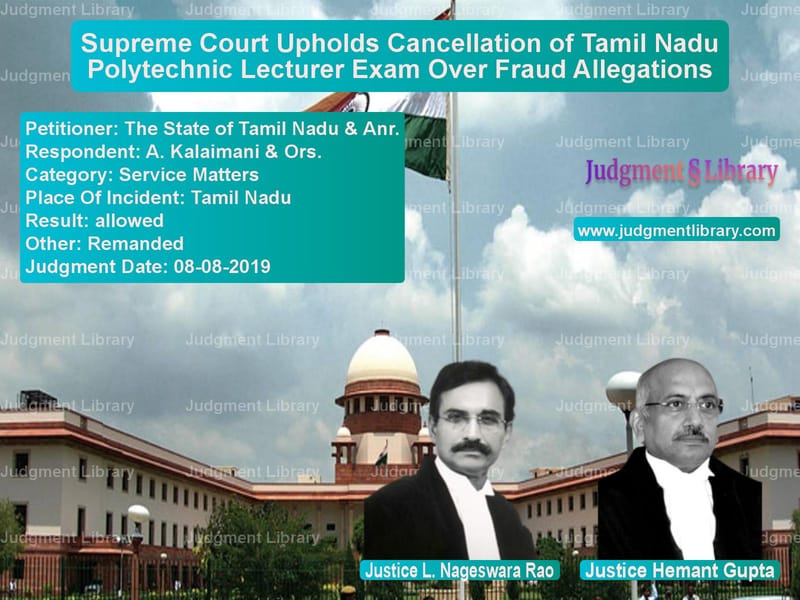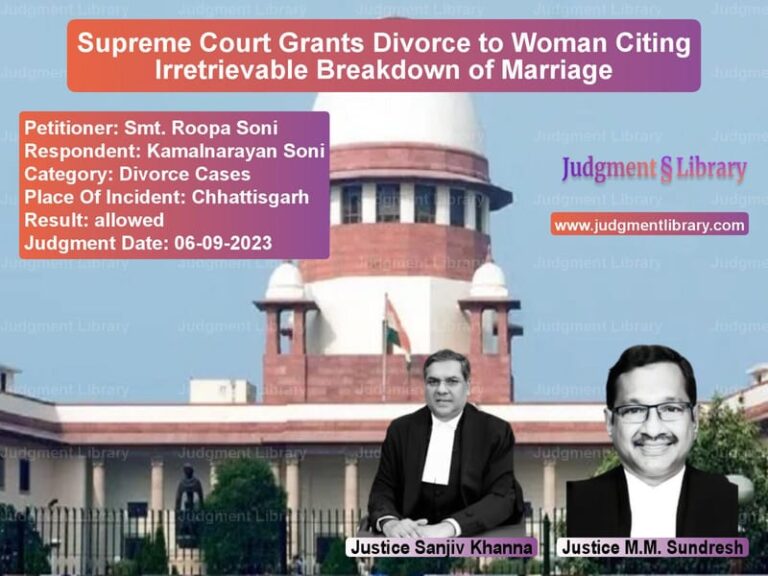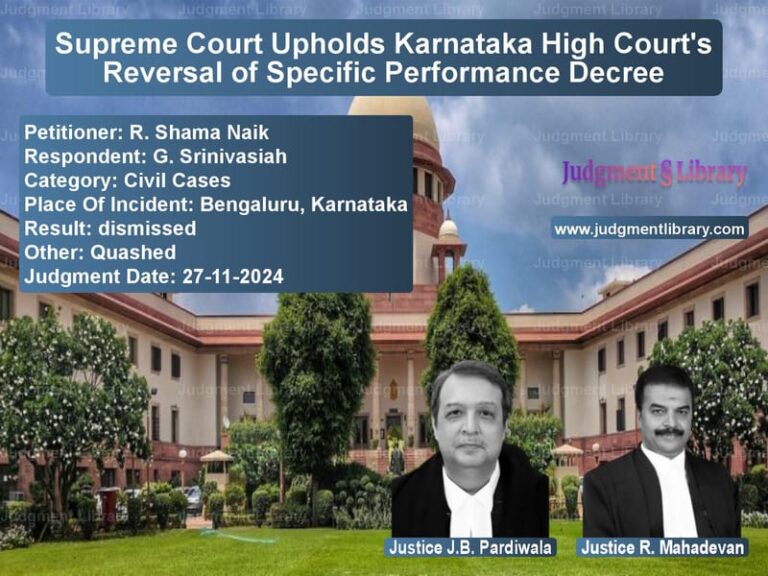Supreme Court Upholds Cancellation of Tamil Nadu Polytechnic Lecturer Exam Over Fraud Allegations
The case of The State of Tamil Nadu & Anr. vs. A. Kalaimani & Ors. revolves around the large-scale malpractices in the recruitment process of Lecturers for Government Polytechnic Colleges in Tamil Nadu. The Supreme Court, in its judgment dated 8th August 2019, upheld the cancellation of the recruitment examination conducted on 16th September 2017. The ruling emphasized the importance of maintaining integrity and fairness in public recruitment processes.
Background of the Case
The Tamil Nadu Teachers Recruitment Board (TRB) issued a notification on 28th July 2017 for the recruitment of 1,058 Lecturers in Government Polytechnic Colleges for the academic year 2017-2018. A total of 1,70,366 candidates applied, out of which 1,33,567 candidates appeared for the written examination.
The examination was conducted using Optical Mark Recognition (OMR) sheets, which were later sent to an external agency, M/s Datatech Methodex Pvt. Ltd., for evaluation. However, complaints of large-scale malpractices were raised, including tampering of OMR sheets.
Key Issues in Dispute
- Whether the cancellation of the entire examination was justified when fraud was identified in a limited number of candidates.
- Whether it was possible to segregate the tainted candidates from the non-tainted ones.
- Whether the Division Bench of the Madras High Court was correct in overturning the decision of the State to cancel the examination.
- Whether the candidates who had cleared the examination without any fraud should suffer due to the malpractices of others.
Arguments by the Petitioner (State of Tamil Nadu)
- The Board discovered that 196 candidates had benefited from the fraudulent tampering of OMR sheets.
- Further scrutiny indicated that 225 candidates had discrepancies in their marks.
- The manipulation involved tampering with OMR answer sheets and altering marks after receiving money.
- Since the extent of the fraud was unknown, the cancellation of the entire examination was necessary to maintain the integrity of the recruitment process.
- The Board relied on the ongoing investigation, which revealed widespread corruption involving external agencies.
Arguments by the Respondents (Candidates Challenging the Cancellation)
- The fraudulent manipulation was limited to only 196 candidates, and the rest of the candidates should not suffer.
- The High Court had already ruled that it was possible to segregate the tainted candidates from the non-tainted ones.
- The cancellation of the entire examination was arbitrary and disproportionate.
- Thousands of honest candidates had worked hard for the examination and should not be forced to retake it.
Supreme Court’s Observations
1. The Importance of Integrity in Public Examinations
The Court emphasized that public recruitment exams must be free from fraud to ensure fairness and credibility. It observed:
“Purity of the examination process is an unquestionable requirement. Rationality is an indispensable aspect of public administration.”
2. The Justification for Cancelling the Entire Examination
The Court rejected the argument that only tainted candidates should be excluded, stating:
“Where large-scale malpractices are detected, the authority of the State to cancel the examination cannot be questioned. It is neither practical nor reasonable to identify every individual involved in the fraud before taking corrective action.”
3. Reaffirming Past Precedents on Examination Malpractices
The Court relied on past judgments, such as Gohil Vishvaraj Hanubhai vs. State of Gujarat, which stated:
“If large-scale irregularities are found, the entire examination can be canceled, and the burden is not on the State to identify and prosecute every single wrongdoer.”
4. The High Court’s Error in Overruling the State’s Decision
The Supreme Court found fault with the Madras High Court’s Division Bench, which had reinstated the examination results. The Court ruled:
“The High Court should not have substituted its decision over that of the State’s recruitment body, which was best placed to assess the depth of the fraud.”
Final Verdict
- The Supreme Court set aside the Division Bench’s order.
- The cancellation of the examination was upheld.
- The Tamil Nadu Teachers Recruitment Board was directed to conduct a fresh examination.
Implications of the Judgment
- Reaffirms the authority of recruitment boards to cancel examinations if large-scale malpractices are detected.
- Protects the credibility of public examinations by prioritizing fairness over individual inconvenience.
- Ensures that no tainted candidates benefit from fraudulent activities.
- Sets a precedent for handling future cases of mass examination fraud.
Conclusion
The Supreme Court’s ruling in this case reinforces the principle that recruitment examinations must be conducted with the highest levels of transparency. While the cancellation of the exam may inconvenience honest candidates, the Court prioritized the long-term credibility of public recruitment processes. This judgment serves as a warning to those attempting to manipulate examinations and strengthens the integrity of competitive selection procedures.
Petitioner Name: The State of Tamil Nadu & Anr..Respondent Name: A. Kalaimani & Ors..Judgment By: Justice L. Nageswara Rao, Justice Hemant Gupta.Place Of Incident: Tamil Nadu.Judgment Date: 08-08-2019.
Don’t miss out on the full details! Download the complete judgment in PDF format below and gain valuable insights instantly!
Download Judgment: The State of Tamil N vs A. Kalaimani & Ors. Supreme Court of India Judgment Dated 08-08-2019.pdf
Direct Downlaod Judgment: Direct downlaod this Judgment
See all petitions in Recruitment Policies
See all petitions in Public Sector Employees
See all petitions in Judgment by L. Nageswara Rao
See all petitions in Judgment by Hemant Gupta
See all petitions in allowed
See all petitions in Remanded
See all petitions in supreme court of India judgments August 2019
See all petitions in 2019 judgments
See all posts in Service Matters Category
See all allowed petitions in Service Matters Category
See all Dismissed petitions in Service Matters Category
See all partially allowed petitions in Service Matters Category







